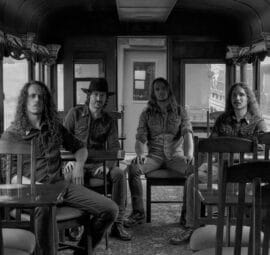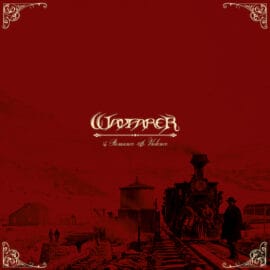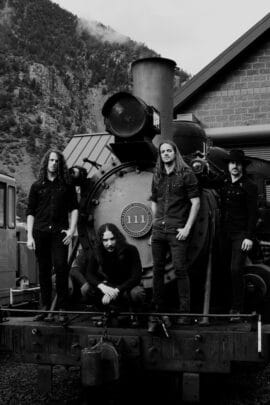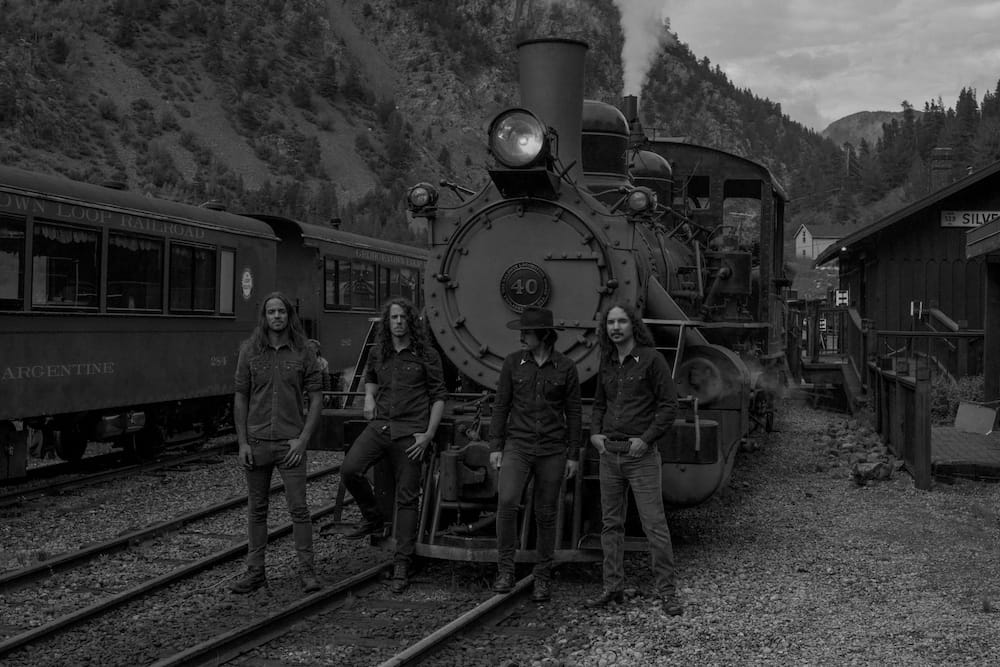The archetype of the badass gunslinger is deeply rooted in our romanticized idea of the „Wild West“. On their latest record „A Romance With Violence“ WAYFARER explore the blood-soaked truth behind this pop-cultural image – resulting in an album that is as effectively constructed as it is impressive, ranging somewhere between Americana and black metal. In our interview, guitarist Shane McCarthy talks about the album’s recording in the midst of the pandemic, his relation to the history of the USA and the Black Lives Matter movement.

As in many other areas of life, the corona pandemic is an omnipresent problem in the music industry at the moment. How severe are you personally and as a band affected by the situation concerning the virus?
Well, it certainly has affected the band, our recording for this album was initially set to begin at the start of April in New York where we did the last one. But obviously timing was not on our side there and things were set back a bit. We ended up scheduling the session locally with Pete deBoer at World Famous Studios, where Isaac had worked in years past with Blood Incantation. But to tell the truth, having the extra time of preparation for an album when schedules are typically so go-go-go turned out to be quite a boon for the record. We were able to dig a lot deeper because of it. But of course it has all but nixed a tour cycle any time soon which is a bit of a heartbreak as we would love to take the record on the road. But everyone is in the same boat here. We all just wait and anticipate. As far as personally, I’ve certainly become much more accustomed to time at home which is good and bad, as both the band and my day job at the Brewery are in flux because of the situation. But it has given us time to slow down and explore many projects, so that is good.
As far as I know, you recorded your current album „A Romance With Violence“ in the middle of the pandemic. How did this make the process different from the work on your previous albums?
It was recorded during the middle of things, for sure. Aside from the aforementioned scheduling issues, we took some precautions around the virus, spending our time basically between home and the studio at that time and wearing masks when appropriate. Beyond that, though, we just got to work. It was a great studio and we had ample time, so we really made sure to flesh everything out properly and immerse ourselves with our time there.
 In your music you combine black metal and Americana music. Besides artists from these genres, you are also influenced by bands from other genres like Opeth or Fields Of The Nephilim, as you have mentioned in other interviews before. How do these influences manifest themselves in your sound – even though they might not be that obvious in your music?
In your music you combine black metal and Americana music. Besides artists from these genres, you are also influenced by bands from other genres like Opeth or Fields Of The Nephilim, as you have mentioned in other interviews before. How do these influences manifest themselves in your sound – even though they might not be that obvious in your music?
We certainly come from a wide array of influence. This is a band of lifetime music nerds who have explored a lot and dove deep into many things over the years. A lot of these things we’ve listened to so long that they are just a part of our psyche really. And I think that’s the key with the band, letting everything come through naturally. If it’s all “this part should be an “x” part and this one a “y” part” then it’s transparent and a bit of a mash up of rehashes. We like to take in everything that’s ingrained in our musical vocabulary and then the band’s voice takes its own shape over time. For example, with heavy and lighter parts in the sound we want it to hold many of those mindsets simultaneously. Writing our black metal parts is just as influenced by the same Americana vibe as the acoustic parts, certain elements just shine through more clearly at times. I think we let everything come into play when we write the music, it’s the only natural way to do it.
In terms of content, you deal with the „Wild West“, as the early settling of European immigrants in the US is known as in pop culture. What originally inspired you to take up this topic?
It is a long time interest of mine as well as several other members of the band. Especially growing up here, the history and aesthetic is something you are exposed to, and with my family background I spent some time on the Western Slope of Colorado when I was young with my grandparents who very much lived after that lifestyle. And of course there are the films and stories, which have always been something that I’ve been pulled into. And really, this album is as much or more about the “Western” than it is the West itself. So that part makes a lot of sense.
Even in critical retrospect, the „Wild West“ is often looked at from the perspective of the settlers. Do you also look into the Native American perspective when you approach the subject?
A bit, in a way – the last album “World’s Blood” was kind of centered around the genocide of native peoples in the United States, but even that was from the perspective of having grown up here, and coming to terms with the presence of something like that in the land’s history. We would never profess to understand anyone else’s experience of something such as that – we can only ruminate on what the air of a place feels like with something like that stained into its soil. This album again kind of circles around how the West has been mythologized into a legend of its own, and what may be behind that. So it’s a bit of a treatise after-the-fact.
Most American black metal bands associated with the so-called „cascadian black metal“ do not deal with the bloody history of the US, but primarily with rather timeless nature romanticism. Do you think that these bands indulge themselves too much in escapism?
Well – first off, we certainly do not consider ourselves anywhere near “cascadian black metal” (laughs), but I don’t know – to each his own. We have beautiful nature here as well and I understand the reverence to such a thing. But after a while post-rock and blast beats with trees on the cover does kind of run its course, I suppose. But we are the ones making cowboy black metal, so who are we to judge (laughs). Music is a great avenue of escape. It’s great to be able to explore mythic lands, old legends, or nature worship or whatever realm through sound – we all just pick our own paths I guess.
A while ago you have voiced support for the Black Lives Matter movement. In the history of America as well as in black metal racism is unfortunately a serious problem. What do you think is the most effective way of taking action against it – especially for fans of black metal who are finding it hard to deal with the radical views of a lot of the genre’s bands?
Yeah, it’s both defeating and unsurprising in a way that something like that is still an issue. I wish I had the answers to how to solve a deep reaching problem like that, but at the end of the day I’m just a guy playing guitar. Personally, I vote, and support people and groups looking out for human decency. It shouldn’t be a political issue. Too often messages get subverted and buried under other people’s aims and interpretations, so it gets difficult, but all you can do is stand by your convictions and try to be decent to other humans at the end of the day. There will always be other ideas about it, but you can’t change others – all there is, is trying to be decent yourself.
 Your new album is called „A Romance With Violence“. Does the title refer to the way the „Wild West“ is often romanticized in the media today? And what do you think is the reason why this epoch is so glorified?
Your new album is called „A Romance With Violence“. Does the title refer to the way the „Wild West“ is often romanticized in the media today? And what do you think is the reason why this epoch is so glorified?
Sure – it’s certainly an exploration of the romanticism and mythologizing of a place in time, and what kind of universal things glare out of that. I think there is something like this in nearly every culture – tales of history that are built up to be grand and heroic over time. At the root of it all are humans, and humans are brutal and attracted to brutality. It’s no different here – in the Western US where our lore is the outlaw and the plains instead of the viking or the samurai. The stories transcend to myth over time, and kind of reveal peoples baser desires a lot of the time. I think that’s certainly the case with the “Wild West” and why those archetypes still hold a place so many years later.
The record seems to have been received very positively, many praised your mixture of Americana and black metal. Do you think there is a risk that some listeners will overhear your lyrical content and internalize the archetype of the gunslinger even more?
Certainly – again, we don’t pretend to be above any of this ourselves, or to have all the answers. With the album we basically wanted to craft a grandiose and bloody western film ourselves, revelling in all of these tropes along the way. If you can look past the surface, there are of course a lot of questions about what really drives these things and what might they really represent – but we don’t claim to have the answers. I think humanity is a question without an answer and this is an exploration of one realm of it.
On the other hand, do you know of listeners who were encouraged by your new record to take a more critical look at the early urbanization of the US?
Well, I would think and certainly hope we are not the first to present such ideas, but I think it’s important to always question the world around you. Blind belief and “patriotism” like religion is not a healthy way to carry one’s self in a world where information is so available. I doubt we’ve changed the hearts and minds of anyone with this, but maybe spurred on some more thought on the age old questions.
 Before the album’s release you have stated that you think your new record is your most sophisticated release to date. What are you referring to in detail?
Before the album’s release you have stated that you think your new record is your most sophisticated release to date. What are you referring to in detail?
I don’t necessarily recall the term sophisticated, but it is certainly the most fully-realized release. By that we just mean this is the album where we knew what we wanted to do from the start – what the concepts were, how it should sound, how it all would look and feel, and we worked intently to bring that all to life. I think this is the one where we kind of checked all the boxes of our intents, which were pretty clear for us from the get go. There are explorations along the way, and a lot of details worked out and added, but I think they all worked to serve a greater whole, and that is what we mean by “fully realized”, I guess. I think it may be the most sophisticated as well but just by nature of being much more experienced at this point, and a product of having good producers along with all hands on deck contributing to the writing.
„A Romance With Violence“ seems to be very well thought-out with the intro, the long tracks and the interludes. How in-depth did you plan the structure of the record in advance?
There was definitely an “arc” to the album that was intended from the get go, and I think some idea of length and flow of how the songs would hope to work together as movements within a whole. But from there it was just about seeing where the writing goes, chasing down the good ideas and the things that excite us along the way. I think we were all so dialed in to the big picture with this one that the ideas that came up were all living inside that wheelhouse anyway, so there was room to explore and let things happen. Along the writing process we would really decide where everything belonged and what didn’t need to be there, to let the album tell a more effective story.
The first track after the intro, „The Crimson Rider“, is less extreme than the following „The Iron Horse“, but also less obviously Americana-influenced than, say, „Vaudeville“. Why did you find it fitting to open the album with a rather moderate black metal track?
I think that song is an effective scene-setter. It shows flashes of a lot of elements of the band and is a good place to start wading in. It’s got big riffs and longer passages that tell the story of the titular figure on the horizon, while weaving in some of the other textures as well. It’s the start of the whole thing, and threads from it and the intro piece are picked up in other tracks on the album.
The mastering of the record was done by Colin Marston and the mixing by V. Santura, two very renowned musicians and producers. Why did you want to entrust them in particular with these respective tasks?
Yes – they’re both great musicians and do a lot of great work behind the desk. We had worked with Colin on the previous album, and as I mentioned before had planned to once again record and mix with him before things changed. But given our past experience together as well as him spending a few weeks on the road with us in 2018 on the WAYFARER tour with Krallice, Colin has a great sense of what we are going for, and it was very easy to get across what we wanted to do with this album in particular. He, of course, did a stellar job as always, and even added some synth to “The Crimson Rider”, reprising a guest role he held on a couple of tracks on “World’s Blood”. With V. Santura, that just came about by being a fan of his work, with The Ruins Of Beverast and Ascension in particular. A mutual friend, Job of Dark Fortress, Ruins, and who knows how many other bands put us in touch and he was very agreeable and professional. He did a fantastic job with the master and I’m sure we will be working with him again in one project or another.
A while ago you announced your collaboration with Doomstar Bookings and asked your fans which bands they would like to see you play live with. Which bands would you yourself like to tour with once it will be possible again?
We are so excited to get back out on the road, and certainly excited to be working with Doomstar. There are a great many bands we would love to share the road with – we of course would love a shot at a package run with someone like Enslaved, Rotting Christ or At The Gates! A tour with Wovenhand or Primordial would also be a dream. There are plenty of modern up and comers like Havukruunu or Oranssi Pazuzu that we would jump at the opportunity to play with as well. We are ready to return to Europe!

What have you planned next for WAYFARER?
Well, aside from hopeful tours before too long, things are quiet on that front for now with the album out. There is talk of some other types of releases over the next year or so, but we are also focusing a lot on our other projects – like Lykotonon, a band among others that James, Isaac and myself all play in – a wild mix of black, death and electronic elements – for which we plan to record a proper debut next year. We will always be keeping busy, and WAYFARER will return as soon as we can fully do so.
At Metal1.info we usually end our interviews with a short brainstorming session. What do the following terms bring to your mind?
Thanksgiving: Family tradition outweighs unsavory origins here. Who doesn’t love leftovers?
Bluegrass: Not my bag. There are good things done with it, of course, and I do like the banjo as an instrument but this has been too ruined by Deadheads for me.
The American Dream: “Bleeding, discarded, thrown from the tracks”
Iron Maiden’s „Run To The Hills“: A ripper, of course. Maiden does no wrong.
Cultural appropriation: Football mascots and Americans dressing up like vikings.
Your favorite drink: Whiskey!
Thanks for your answers. If there is anything else you would like to share with the readers, please feel free to do so at this point:
Thank you for taking the time!
Dieses Interview wurde per E-Mail geführt.
Zur besseren Lesbarkeit wurden Smilies ersetzt.
